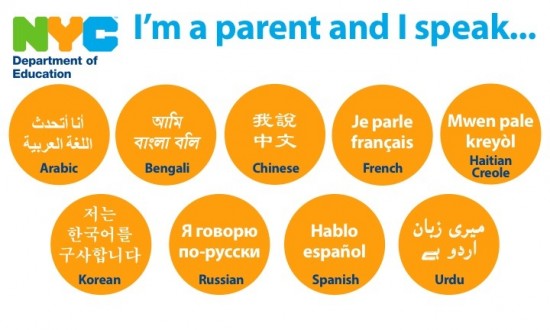
Interpreting program for parents underused, advocates say
In the weeks before Christmas, PS 146 on Cauldwell Ave. in Morrisania, exuded energy. Handmade decorations brightened every corner and songs sung in different languages burst out from classrooms.
In the hallway, one colorful sign among many hung on the walls spoke out to everyone: “Welcome parents!” in eight languages.
Right below it, another sign read: “Interpretation services available,” in those same eight languages.
The “No Child Left Behind” Act, established by the Bush administration in 2002, stated that all students should have equal access to a high quality education. But in the Bronx, where the number of residents who speak English “not well” or “not at all” has risen by about 15 percent to over 312,000 since 1990, language is a significant barrier to achieving that goal.
“In my 20 years in this school, I have seen the number of non-English speaking families rise by dozens,” said Yvette Johnson, parent coordinator at PS 146, where nearly one in five of the school’s 459 students comes from families that don’t speak English fluently.
“The kids usually learn the language fast; it is the parents who have most problems,” said Johnson.
To help parents with limited English become involved in their children’s education, the city’s Department of Education in 2002 created a translation and interpretation unit for public schools.
Though initially meant to translate school documents, the unit now employs more than 40 staffers who interpret and translate in the city’s most commonly spoken second languages: Arabic, Bengali, Chinese, French, Haitian Creole, Korean, Russian, Spanish and Urdu.
But according to New York-based non-profit Advocates for Children, which published a report in 2009 on immigrant children in the city’s public schools, the system is not working.
“There are serious lapses in the service,” said Gisela Alvarez, the group’s senior project director. “It is still not widely available.”
The Department of Education declined to comment.
“There is just not money enough,” said Evelyn Rodríguez, parent coordinator at Samuel J. Gompers High School in Mott Haven, where almost a fifth of the 672 students are from families with limited English. “Translators are expensive.”
Gompers’ budget was cut by about 15 percent this year. To save money, schools like Gompers are using the assets they have.
“Usually it is a member of the staff who interprets for the parents. Sometimes it’s the kids who do it,” said Johnson. “And that can backfire pretty badly.”
“We have had parents who had no idea their kid was failing because they would just rely on what the child was saying,” said Alvarez. “And they would make up what the grades stand for.”
Many school administrators are unaware the language program exists, Alvarez says, and many parents turn the service down even when it is offered.
“Parents are not comfortable telling a complete stranger their problems, and especially their children’s problems,” she said.
It’s often the parent with the weakest English who communicates with the schools, officials said. “It is not unusual that only the father speaks good English, because they need it at work,” said Johnson. “The mother can get by with little or no knowledge of English – and it is usually them who take care of the children’s education.”
“We have parents that would like to participate more in their kid’s school life, but they don’t want to cause any trouble,” said Rodriguez. “So even if we can provide a translator, they don’t ask.”
Advocates for Children reported that four of every five parents they interviewed said they wanted to have a more active role in their children’s education.
Jeannette Bocanegra, spokesperson for the Mott Haven organization Community Connections for Youth, says parents often complain of lack of communication with their child’s school. Usually, language is the reason for the communication breakdown.
“Parents lament that they had no idea their son had a problem at school, because they could not read the reports,” said Bocanegra. “And if they asked their son, they would just give some vague answer, or none at all.”
Would interpreting services help? “Maybe,” said Bocanegra. “It would definitely be a step forward.”
